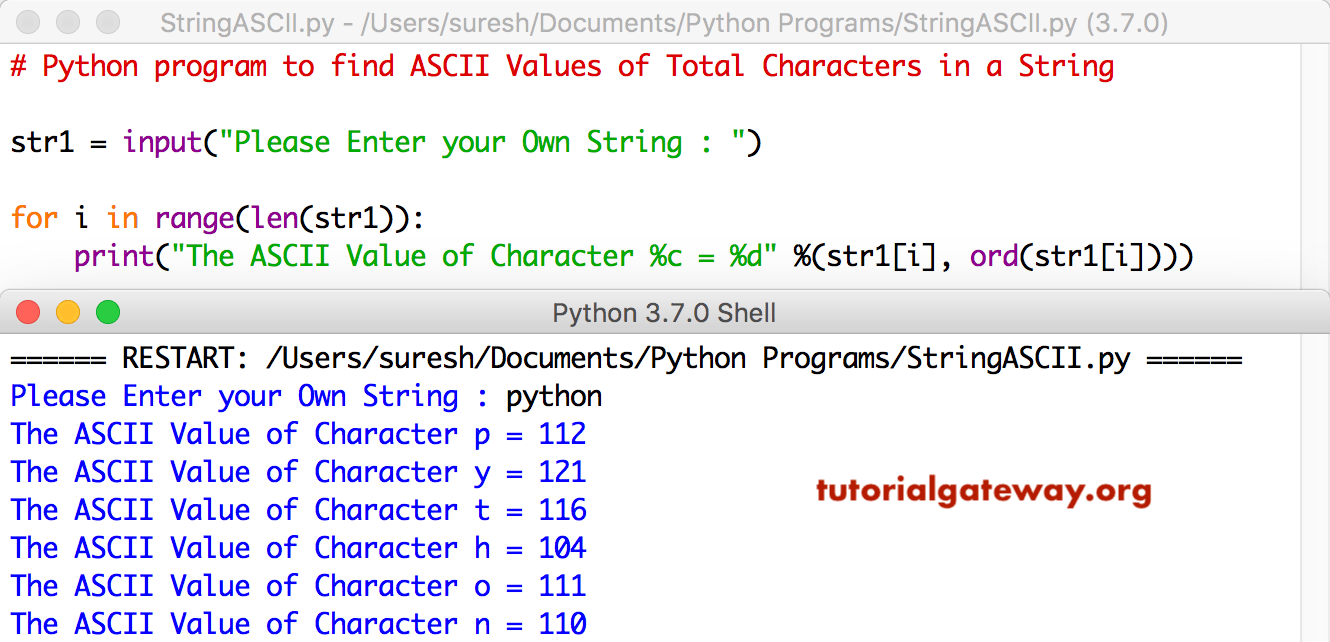python ascii to string – python convert string to ascii
· 2, Using Decode function to convert bytes to string in Python, In this example, we will be using the decode function, The function is used to convert from the encoding scheme, in which the argument string is encoded to the desired encoding scheme, This works just opposite to the encode, Let us look at the example for understanding the concept in detail,
Python Convert Unicode to Bytes ASCII UTF-8 Raw String
string,printable¶ String of ASCII characters which are considered printable This is a combination of digits ascii_letters punctuation and whitespace string,whitespace¶ A string containing all ASCII characters that are considered whitespace, This includes the characters space, tab, linefeed, return, formfeed, and vertical tab,
binascii — Convert between binary and ASCII — Python 39,6
· Given ASCII or alphabetical range, filter strings found in particular range, Input : test_list = [“gfg”, “is”, “best”, “for”, “geeks”], strt_asc, end_asc = 105, 115, Output : [‘is’] Explanation : i has 105, and s has 115, which is in range ASCII values, Input : test_list = [“gfg”, “is”, “best”, “for”, “geeks”], strt_asc, end_asc = 100, 115,
PyPi has a unidecode module, it exports a function that takes a Unicode string and returns a string that can be encoded into ASCII bytes in Python 3,x: >>>from unidecode import unidecode >>>printunidecodeA # …
· Approach: Give the string as static input and store it in a variable Take an empty list say “ASCII_vals” and store it in another variable Loop the above-given string using the for loop Calculate the ASCII value of the iterator using the ord function and store it in another variable, Append the
Just load your ASCII and it will automatically get converted to a string, There are no intrusive ads, popups or nonsense, just an ASCII to string converter, Load ASCII, get a string, Created for developers by developers from
string — Common string operations — Python 39,6 documentation
Convert ASCII Code to a String
Python
python ascii to string
Python
Convert ASCII to String in Python
· Perform hexbin4 binary-to-ASCII translation and return the resulting string The argument should already be RLE-coded and have a length divisible by 3 except possibly the last fragment,
· Given a list of ASCII values, write a Python program to convert those values to their character and make a string, Given below are a few methods to solve the problem, Method #1: Using Naive Method
python convert ascii code to string Code Example
· Python queries related to “python convert ascii code to string” convert ascii char to int python; find the ascii value of a character in python

3 Proven Ways to Convert ASCII to String in Python
In python we have discussed many concepts and conversions But sometimes we come to a situation where we need to convert ASCII into string in python In this tutorial we will be discussing how to convert ASCII into strings in python As the conversion of elements has been a handy utility as it offers it in a much simpler way than other lan…What Are ASCII Values?
5 Ways to Convert bytes to string in Python
Convert String to ASCII Value in Python
Use the for Loop Along With the ord Function to Get ASCII of a String in Python, We can use the for loop and the ord function to get the ASCII value of the string, The ord function returns the Unicode of the passed string, It accepts 1 as the length of the string,
Python Program to Convert each Character in a String to an
Convert ASCII to Text in Python, We are using the chr function to convert ASCII to string, Which is a built-in function in Python that accepts a specified Unicode ASCII value as an argument and returns the character, The syntax of chr is: chrnum
How do I convert a list of ascii values to a string in python?
71 114 101 101 116 105 110, 103, 115, 33 “”” hello = [71, 114, 101, 101, 116, 105, 110, 103, 115, 33] pmsg = ”,joinchri for i in hello printpmsg for i in range33, 256: print” ascii: {0} char: {1}”,formati, chri working_ascii
You are probably looking for ‘chr’: >>> L = [104, 101, 108, 108, 111, 44, 32, 119, 111, 114, 108, 100]
>>> ”,joinchri for i in L
‘hello, world’Meilleure réponse, 148Same basic solution as others, but I personally prefer to use map instead of the list comprehension:
>>> L = [104, 101, 108, 108, 111, 44, 32, 11925import array
def f7list:
return array,array’B’, list,tostring
from Python Patterns – An Optimization Anecdote14l = [83, 84, 65, 67, 75]
s = “”,join[chrc for c in l]
print s8Perhaps not as Pyhtonic a solution, but easier to read for noobs like me: charlist = [34, 38, 49, 67, 89, 45, 103, 105, 119, 125]
mystring = “”
for5You can use byteslist,decode to do this – and liststring,encode to get the values back,5def working_ascii:
“””
G r e e t i n g s !
71, 114, 101, 101, 116, 105, 110, 103, 115, 33
“””3I’ve timed the existing answers, Code to reproduce is below, TLDR is that bytesseq,decode is by far the fastest, Results here: test_bytes_de0Question = [67, 121, 98, 101, 114, 71, 105, 114, 108, 122]
print”,joinchrnumber for number in Question
| Convert string to ASCII value python | 08/12/2011 |
| How to check if a string in Python is in ASCII? – Stack | 12/10/2008 |
Afficher plus de résultats